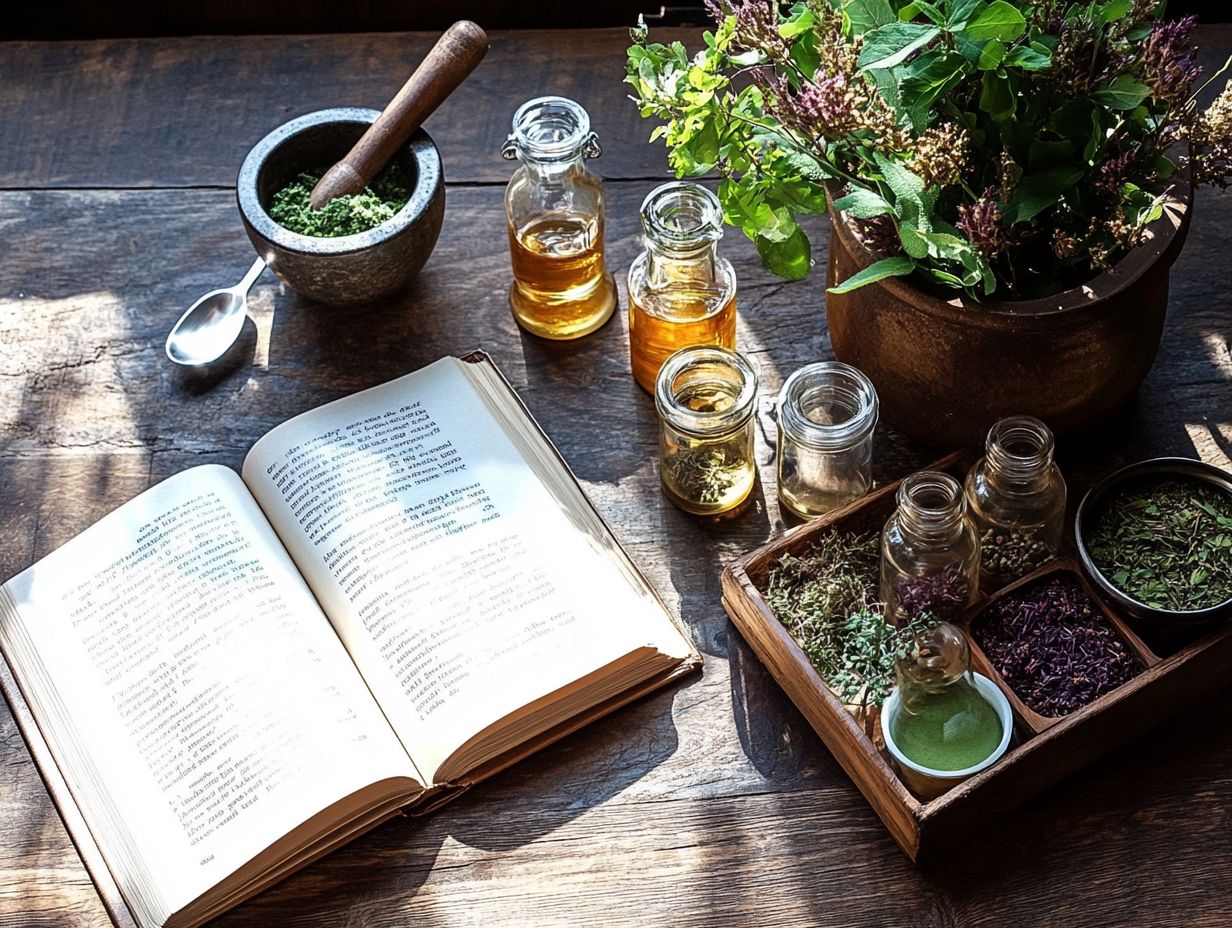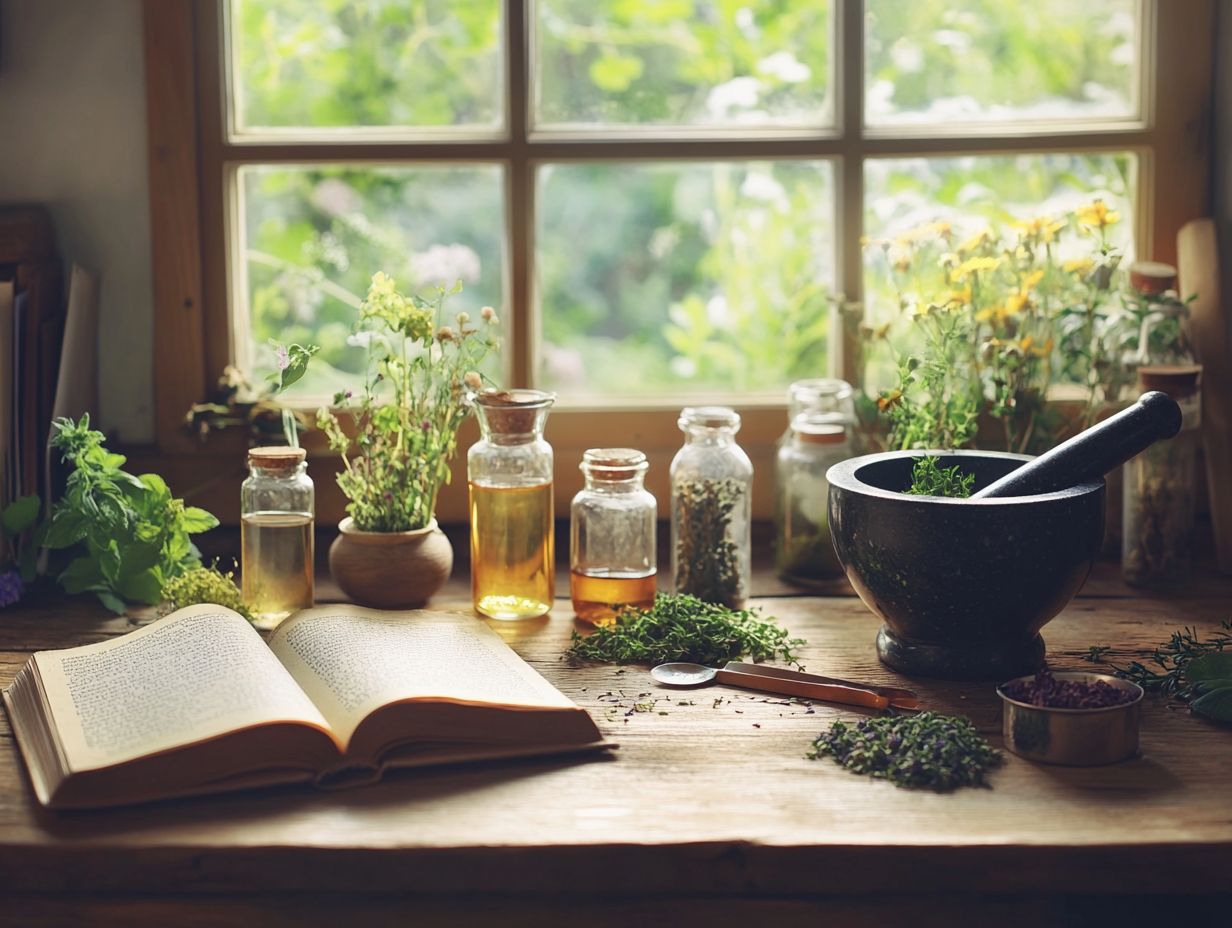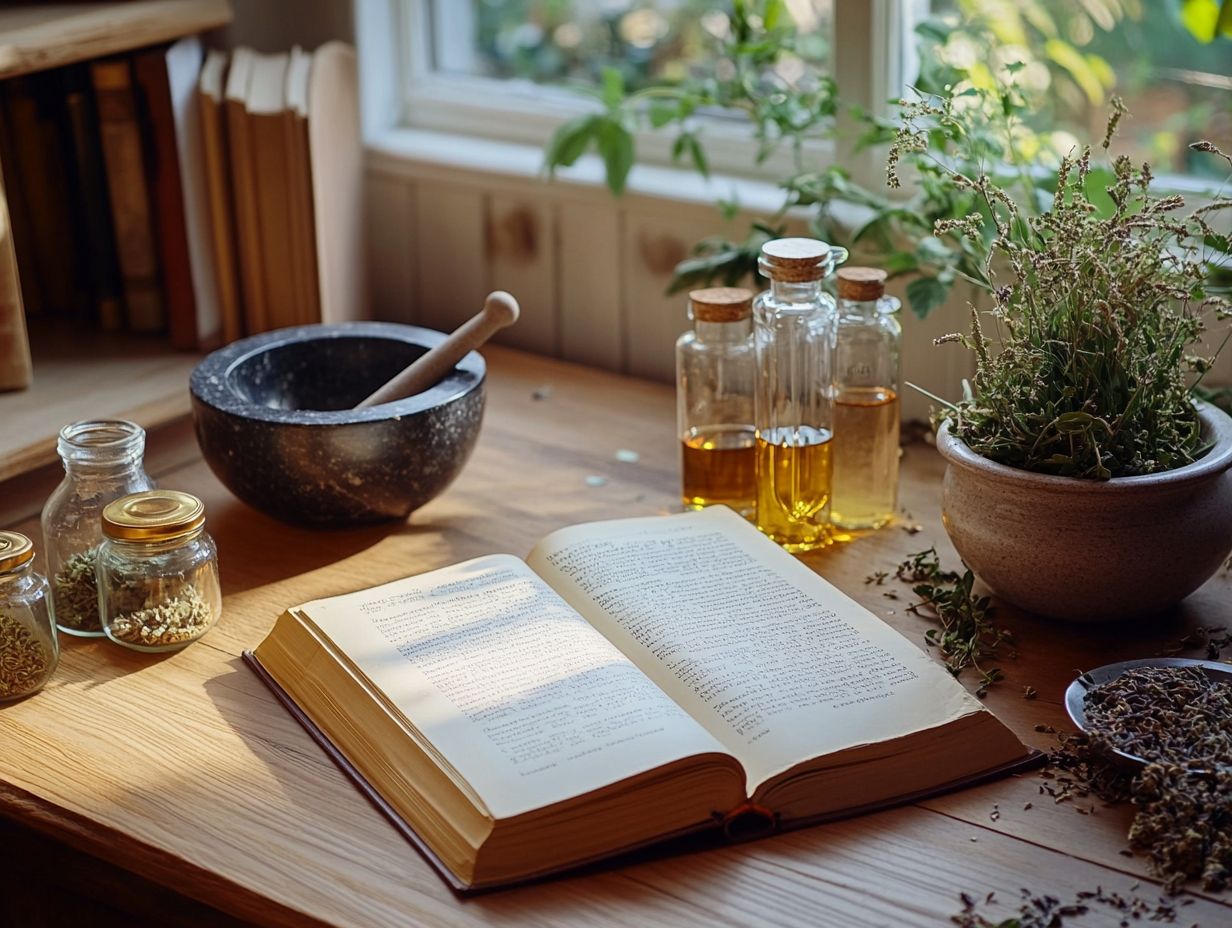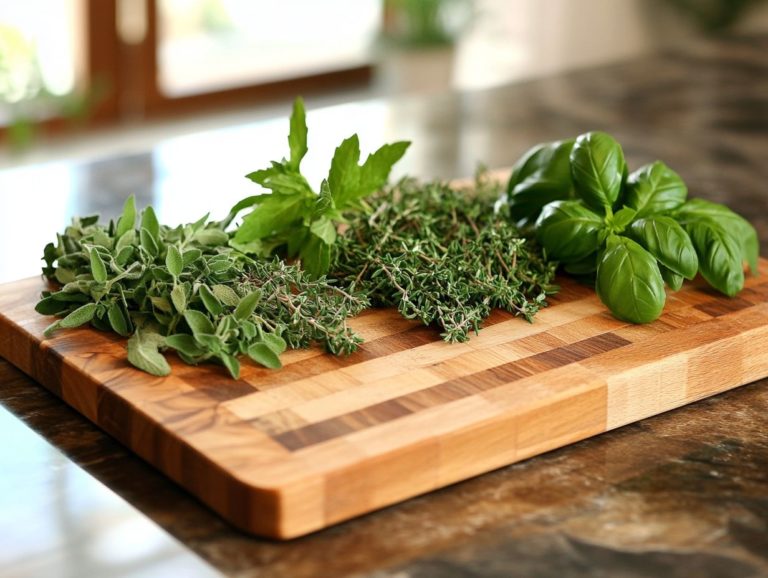Understanding Herbal Extraction Methods and Dosages
Herbal extraction is a fascinating process that transforms raw plant materials into powerful remedies. With various extraction methods available water, alcohol, and oil each technique presents distinct benefits and flavors, making it a vital aspect of herbal medicine and supplements.
Determining the right dosage for herbal extracts can feel daunting. This guide delves into the factors influencing dosages and offers clear guidelines for different herbs used for various health conditions. You’ll find it invaluable in selecting the perfect herbal extract tailored to your health needs, considering both potency and quality.
Dive into the exciting world of herbal remedies! With a broad array of herbal supplements available, understanding how these plant-based products can aid in addressing common health problems is essential.
Contents
- Key Takeaways:
- Common Methods of Herbal Extraction
- Determining Dosages of Herbal Extracts
- Choosing the Right Herbal Extract for Your Needs
- Frequently Asked Questions
- What are the different extraction methods used for herbal medicines?
- What is the difference between a standardized extract and a whole herb extract?
- How do I determine the appropriate dosage for a herbal extract?
- Can herbal extracts be used for children and pregnant women?
- What are the potential benefits of using herbal extracts compared to traditional herbal preparations?
- Can I combine multiple herbal extracts for a more potent effect?
Key Takeaways:

- Herbal extraction obtains beneficial compounds from plants for medicinal use.
- The dosage of herbal extracts depends on individual health, extract potency, and specific health concerns.
- When choosing an herbal extract, consider potency, quality, and the health concern you wish to address.
What is Herbal Extraction?
Herbal extraction is the careful process of transforming various parts of plants roots, leaves, and flowers into concentrated forms of herbal supplements through various techniques. This method is foundational in herbal medicine, allowing you to harness the health-promoting properties of these remarkable plant-based products.
To maximize the therapeutic compounds found in herbs, methods like using liquids to pull out plant compounds are employed. Knowing the quality of herbal extracts is important because it ensures the potency and purity of the extracts, especially concerning consumer information and regulations. For more insights, refer to understanding herbal dosage, which is vital for addressing common health concerns like anxiety, inflammation, and digestive disorders, often managed through effective herbal remedies.
Strict regulations ensure these products are safe for consumption, with oversight from the FDA maintaining the standards of herbal supplements in the United States. Clinical trials often validate the effectiveness of these extracts, showcasing their potential to provide relief and support for various ailments. This highlights the efficacy of herbalism compared to conventional medicines.
Common Methods of Herbal Extraction
Common methods of herbal extraction include water-based, alcohol-based, and oil-based techniques. Each method is tailored to draw out beneficial compounds from various plant sources, allowing for a diverse range of botanical extracts.
By employing these methods, you can effectively isolate the active ingredients of herbal supplements while upholding safety and quality during testing and manufacturing processes, which are crucial for maintaining the product’s consistency and purity.
Start your journey to better health with herbal extracts today!
Water-Based Extraction
Water-based extraction is a key method in herbal medicine. It helps draw out essences from plants while keeping their health benefits intact.
This technique preserves the natural properties of herbs. It ensures their effectiveness aligns with quality standards, vital for over-the-counter products.
Take tea making, for instance. By steeping dried herbs in hot water, you allow the active compounds to be effectively released.
This maximizes nutrient extraction and provides a calming experience, showcasing the therapeutic properties that herbs can offer.
When prepared with care, these infusions can unveil a range of benefits. They promote relaxation and aid digestion.
The quality of the herbs is essential, as factors like sourcing and drying methods can significantly impact the final product’s effectiveness.
Traditional herbal remedies depend on these principles. Water extraction is essential for their enduring relevance.
Alcohol-Based Extraction

Alcohol-based extraction, known as tincturing, uses alcohol to extract active ingredients. This method creates strong botanical extracts popular in herbal supplements.
The tincturing process starts with selecting the right herbs. Echinacea, valerian, and milk thistle are great choices for their unique benefits.
Soaking the plant material in alcohol for several weeks allows the beneficial compounds to release their magic. You receive a tincture with high potency and a long shelf life.
However, consider potential side effects from the alcohol, especially for those sensitive or pregnant.
Understanding the balance of benefits and risks is essential for integrating herbal remedies. Discuss your options with your healthcare provider.
Oil-Based Extraction
Oil-based extraction captures essential oils from plants. It provides powerful herbal supplements for various health conditions.
This process emphasizes quality to ensure the purity and effectiveness of the extracted oils, following traditional practices.
Popular methods include cold pressing and steam distillation. Cold pressing works well for citrus fruits, while steam distillation is ideal for herbs like lavender and peppermint.
These methods influence aroma and therapeutic benefits, which can vary based on the plant extracts used.
Investing in rigorous testing is crucial. This ensures each batch meets strict quality standards, safeguarding the integrity of the essential oils.
Determining Dosages of Herbal Extracts
Determining the appropriate dosages of herbal extracts is essential for both safety and effectiveness. This is particularly important when addressing various health conditions through herbal supplements. Don’t wait speak with your healthcare provider today to find the best herbal solutions for you!
It’s advisable to consult with a healthcare provider to tailor dosage recommendations specifically to your needs. This ensures that the supplements harmonize with your individual health profile and any prescription medicines you may be taking.
Factors Affecting Dosage
Several factors influence the appropriate dosage of herbal supplements for you. These include your age, weight, health condition, and overall health goals.
It’s exciting to consult with a healthcare provider who can help personalize the dosage to your specific needs. Safety is paramount; incorrect dosages can lead to unwanted side effects, including potential allergic reactions or reduced efficacy.
For instance, if you’re considering willow bark for pain relief, you may need lower dosages if you’re older due to how your body processes herbal extracts. Conversely, if you have specific conditions like inflammatory disorders, higher doses might be more beneficial. To avoid potential issues, be aware of the 5 common herbal dosage mistakes and always ensure you discuss these options with your healthcare provider.
When considering herbs like ashwagandha for stress management, personalizing your dosage can be key. Some individuals find that a smaller amount works wonders, while others might require more to achieve their desired effects.
Keeping an open line of communication with your healthcare professional ensures that safety measures are in place and enhances your therapeutic outcomes while integrating herbal supplements into your routine.
Recommended Dosages for Different Herbs

Recommended dosages for various herbal extracts can differ significantly based on their intended use and the health conditions you’re addressing. This underscores why you should choose wisely!
Insights from clinical research and consumer information highlight the importance of careful consideration and expert guidance from healthcare providers and pharmacists. Consulting with a healthcare provider can help you pinpoint the most effective dosages tailored to your unique situation, including understanding how to measure herbal dosages accurately.
Understanding the nuances of dosages is vital, especially given the variability in natural products. For example, herbal remedies like peppermint are often suggested for digestive issues, while echinacea is commonly used for immune support. It’s important to refer to dosage recommendations for popular herbs to ensure safety and effectiveness.
Take chamomile tea, for example; you might enjoy it in larger quantities for relaxation, but concentrated extracts require precision to avoid potential side effects. Not all formulations carry the same potency, which can be influenced by factors like quality parameters and the extraction methods used.
Be aware that some herbs can interact with medications, so seeking professional advice is key. This way, you can fully harness the benefits of herbal medicine while minimizing risks, ensuring that your choices align perfectly with your personal health needs.
Choosing the Right Herbal Extract for Your Needs
Selecting the right herbal extract tailored to your unique health needs requires a discerning understanding of the potency and quality of various products.
With a vast array of herbal supplements at your disposal, it’s essential for you to be well-informed, enabling you to make choices that align with your wellness journey.
Key Factors to Consider:
- Consultation: Speak with your healthcare provider.
- Personalization: Tailor dosages to your individual needs.
- Research: Understand the herbs and their uses.
- Quality: Select high-quality products.
Understanding Potency and Quality
Understanding the potency and quality of herbal extracts is crucial for consumers. These factors impact the efficacy of active ingredients in the products you choose.
Potency is typically assessed through various methods, including the concentration of active compounds and how well your body can absorb these compounds. This means you should go beyond simply reading labels; it’s important to grasp the significance of standardization practices.
Manufacturers use standardization practices to ensure consistent quality and strength with each batch. Adherence to regulations, such as Good Manufacturing Practices (GMP), enhances the credibility and safety of the products you consider.
To effectively assess herbal products, look for:
- Certifications from reputable organizations
- Third-party testing results
- Information on the cultivation and extraction methods used
By doing so, you can ensure that you’re selecting high-quality and reliable options.
Considerations for Specific Health Concerns
When selecting herbal extracts for your specific health concerns, consider your individual needs, potential interactions with other medications, and the advice of a healthcare provider. This approach ensures the safe and effective use of herbal remedies, allowing you to make informed decisions.
If you’re dealing with anxiety, chamomile or valerian root might be your go-to options, thanks to their calming properties. If insomnia is your challenge, you might find relief with passionflower or lavender extracts, both renowned for their sedative effects. On the digestive front, peppermint or ginger can work wonders, celebrated for their soothing qualities on the gastrointestinal tract.
Remember, your health needs are uniquely yours. Consulting healthcare professionals can offer tailored guidance, ensuring you choose the right herbal extract for optimal health outcomes. For more information on herbal remedies and safe dosage, consider exploring reputable resources.
Frequently Asked Questions

What are the different extraction methods used for herbal medicines?
There are various extraction methods for herbal medicines, including maceration, percolation, decoction, infusion, and tincture. Each method has its advantages and is used for specific types of herbs.
What is the difference between a standardized extract and a whole herb extract?
A standardized extract contains specific, quantifiable amounts of active compounds from the herb, while a whole herb extract contains all of the plant’s compounds in their natural ratios. Standardized extracts are usually preferred for their consistent potency, while whole herb extracts may provide a broader range of therapeutic effects.
How do I determine the appropriate dosage for a herbal extract?
The recommended dosage for herbal extracts can vary depending on factors such as the type of herb, its potency, and the person’s individual needs. It is best to consult with a qualified herbalist or follow the dosage instructions provided by the manufacturer.
Can herbal extracts be used for children and pregnant women?
Some herbal extracts may be safe for use in children and pregnant women, but it is important to consult with a healthcare professional before administering any herbal medicine. Certain herbs may have potential side effects or interactions with medications.
What are the potential benefits of using herbal extracts compared to traditional herbal preparations?
Many believe herbal extracts have a higher concentration of active compounds, making them more potent and effective compared to traditional herbal preparations. They may also have a longer shelf life and be easier to consume.
Can I combine multiple herbal extracts for a more potent effect?
Yes, mixing different herbal extracts can enhance their benefits! However, consult a healthcare professional first to avoid any interactions.





